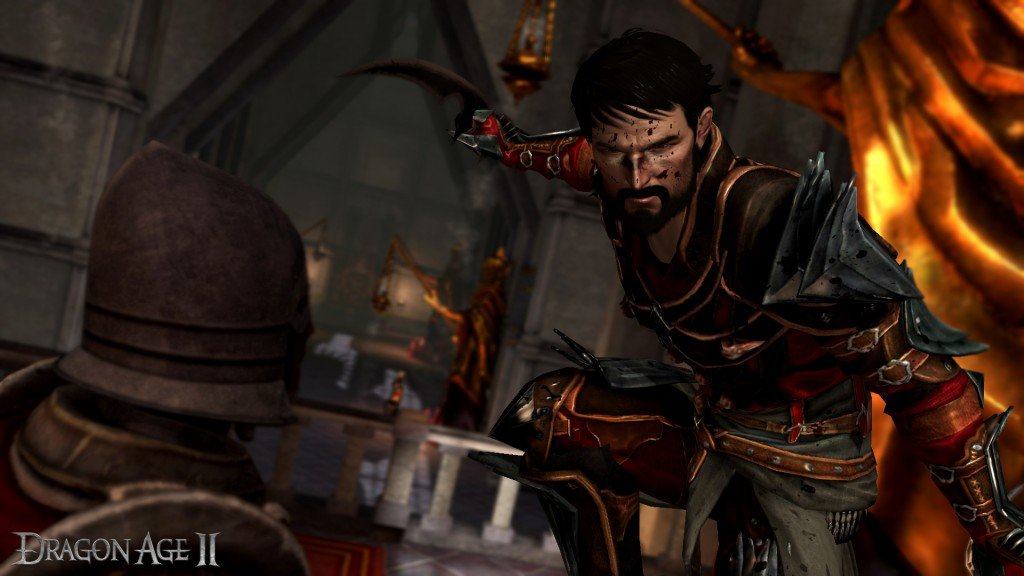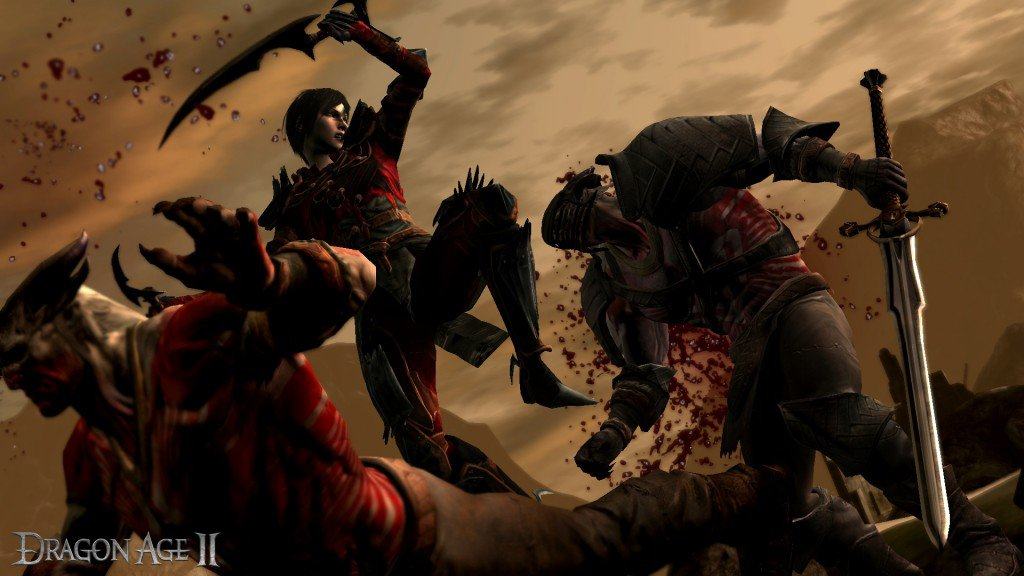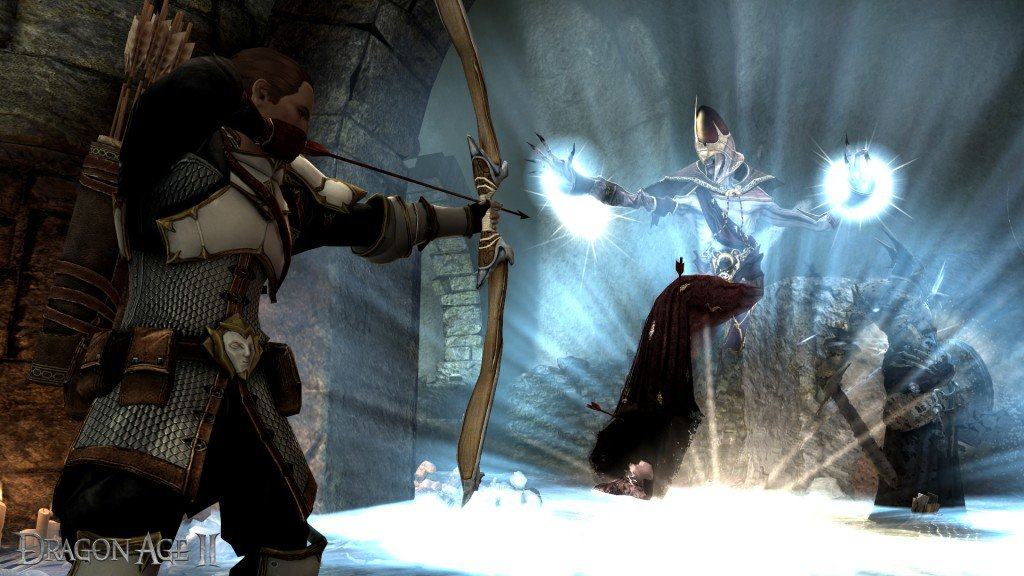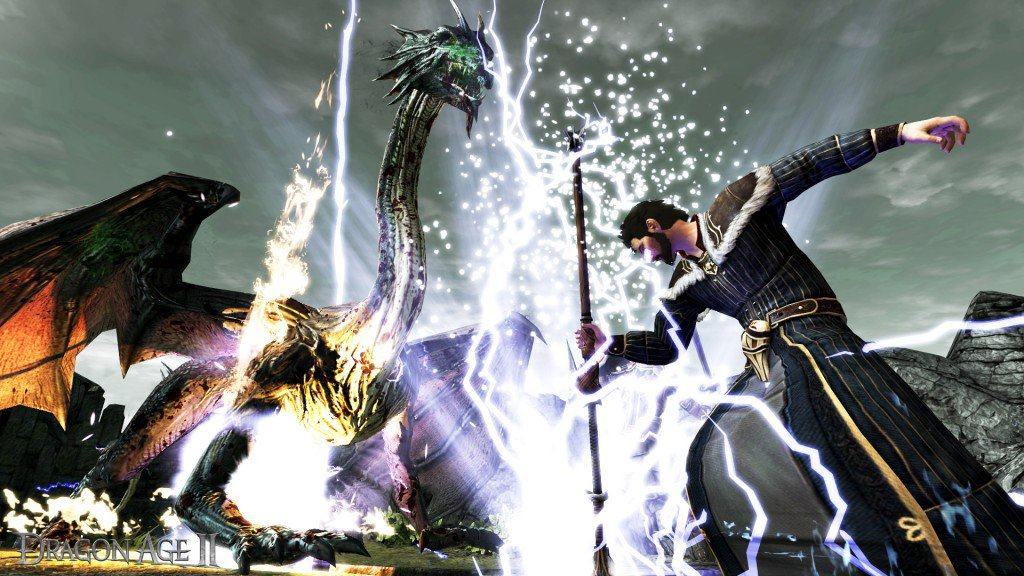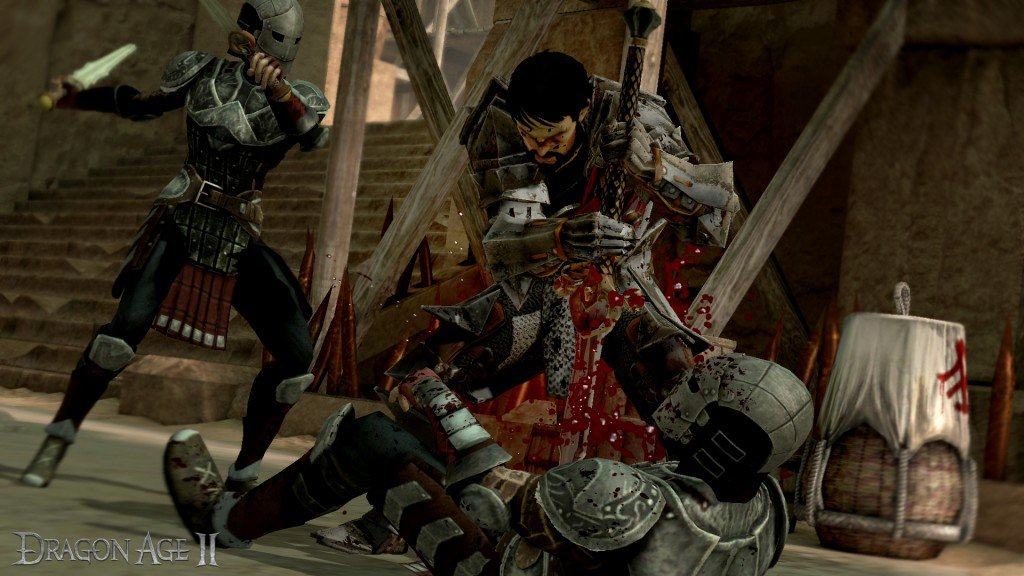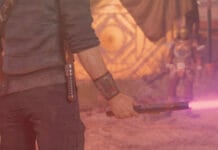True confession: Dragon Age: Origins was my first Western Role-Playing Game (RPG). Ever. I didn’t even know what Baldur’s Gate was. I was – and admittedly still am – a Japanese RPG kind of girl. Little did I know that the box with the blood-formed dragon would soon become one of my favorite games of all time. Dragon Age: Origins gave me everything I love about novels (particularly fantasy) in visual form: rich lore, engaging story, complex and heart-capturing characters. It is a game I pick up again and again, sometimes minutes after the epilogue.
So when I heard about Dragon Age 2, I was excited. I even preordered a signature PC edition. While I don’t regret the purchase, I know plenty of gamers would insist that for Dragon Age 2 it was a complete waste of money.
Bioware pointed the series in a new direction, and the changes are apparent almost from the loading screen. Dragon Age 2 tells the story of Hawke, a Fereldan refugee who flees Lothering for Kirkwall, “the city of chains”. The game follows Hawke as he makes a name for himself, rising in prominence to “champion”. From the above two sentences, anyone who has played Dragon Age: Origins will notice a major change: there are no origins. Hawke is, and always will be, a human refugee. The decision for a scripted character may be understandable – Bioware is most likely piggybacking on the popularity of Commander Shepard – but going from choosing a race and background which will affect not only people’s reactions to you but also some of the decisions you can make, to choosing only appearance, class, and a first name which will never be referenced, is an abrupt change. Whether or not it’s disappointing (I do so love my elves) or down-right infuriating depends on the type of gamer you are. Bioware also decided to do away with the silent protagonist and revamped Origin’s dialogue tree until it resembled the dialogue wheel of Mass Effect. Like Commander Shepard, Hawke can be diplomatic/good, sarcastic/charming, or aggressive/violent. Your initial choice in each segment of the game dictates the dialogue set Hawke will use. It can be changed, of course, but it takes time. And it may make your Hawke seem a little bit schizophrenic.
Hawke, whether he’s sweet enough to rot your teeth or only interested in knocking them out, spends most of his time in and around Kirkwall. The city has its own character, one made more unique by the sheer number of lunatics. Kirkwall does have a serious lack of interior decorators, however. Throughout the thirty-plus hours of gameplay, you will encounter the same warehouse, mansion, and cave. Again and again. Locked doors and the location of that fire bomb you stepped on last time are about the only differences between visits. Even Hawke’s home bears a striking resemblance to lord what’s-his-name’s mansion you infiltrated not even an hour ago. Rushed development is the most cited cause, but there is really no excuse for such laziness, especially after the rich backdrop of Origins. It should be noted that Bioware is addressing this massive recycling in their story-driven DLC. Unfortunately, it may be too little too late for many gamers.
What Kirkwall doesn’t lack, however, are enemies, and combat has been adjusted to meet the upswing. Combat speed has increased, for which I thank the maker, but there is just something wrong when my dual-wielding rogue is stomping towards an enemy hunched over like a boulder is crushing him. Some classes, such as the archer, have been overhauled entirely to make playing them actually enjoyable. Hand-to-hand combat has also been introduced to mages, allowing them to at least make a show of defending themselves when enemies slip past the tanks. Combat, however, has become flashier: rogues backflip away from enemies, mages twirl and slam their staves, enemies explode in showers of blood and guts. At certain points it makes combat almost comical. Strategy has been almost eliminated. Unless you are playing on the hardest levels, there is almost no need to micromanage your party outside of a few choice battles. Enemy AI has also abandoned strategy. Instead of the clever, and occasionally frustrating, commanding done by elite darkspawn, you now have enemy waves. The numbers trying to overwhelm you can sometimes causes enemies to materialize out of thin air – usually right behind your mage and archer. These changes are not necessarily bad, if you happen to be a bit of an action/adventure gamer. If you prefer tactics though, you might find yourself cringing.
One of the things Bioware has always done well, however, continues. Dragon Age 2’s cast of characters offers a rich variety of attitudes, values, and perspectives. Your companions in particular, having come from such vastly different walks of life – Rivani pirate and renegade apostate, or lyrium-imbued Tevinter slave and ostracized Dalish First – will provide the most memorable moments and richest dialogue in the game. Walking around Kirkwall is never more fun than when the mage-hating slave and the renegade mage (or the upstanding guard captain and the morally-questionable pirate) are verbally at each other’s throats. The experience is made only richer in being able to watch their relationships to Hawke, and one another, change over the course of the game. Some of those changes are heartwarming, others brutal.
This is not to say that the companion system hasn’t undergone any changes. Armor customisation has been replaced with permanent companion outfits. Stats are raised through accessories and upgrades that can be found or purchased throughout the game. While I like the idea of companions having unique looks, I would have preferred the Morrigan approach: a set of robes (or armour) special to each character that could be removed or replaced with an updated version after a specific companion quest. Party camp is also gone; now each companion has a “home”. Story-wise it makes sense, considering all events take place in and around Kirkwall. But in taking away the camp, Bioware also took away our ability to see everyone at once – and level them up at once. Now whenever you want to level up or update weaponry, companions must be swapped in and out of the active party. This is an irritating waste of time. Even worse, by giving them homes, Bioware greatly limits companion conversation. You can no longer turn around mid-quest and ask Isabella for tales of her life on the high-seas, or Anders’ life in the Circle. Those conversations are now a subset of companion quests, and a small subset at that. The conversations are rich, full of depth and revelations, but ultimately less satisfying because of quantity.
Dragon Age 2 isn’t a bad game. It has an interesting and rather engaging story, unique and memorable characters, and entertaining gameplay. These more than make up for some of the game’s more obvious flaws. If it had had been released as a solo title, or as a spin-off, it might have done well. It may have even been branded one of Bioware’s less prestigious games, but it probably wouldn’t have gotten the visceral reaction it has. Dragon Age 2 has polarised the series’ fan base. And where you fall after playing it depends entirely upon the kind of gamer you are. If you’re a fan of the old-school Western RPG, if you enjoy tactical role-playing, or if you fell in love with Dragon Age: Origins, you might be disappointed. But if you haven’t played Origins, if you are a bit of an action/adventurer, or if you are like me and Dragon Age 2 is the second Western RPG you’ve played, you may enjoy it. The difference between Dragon Age: Origins and Dragon Age 2 reminds me of the difference between high fantasy and light fantasy. If I want depth, richness, and visceral satisfaction, I reach for Tolkien – and a bottle of ibuprofen. But if I want something shallower but more readily accessible, and something that is just as fun, I pull out the Fortress Series… and Dragon Age 2.
| Time Played | 20+ hours |
| Difficulty | Default |
| Platform | Microsoft Windows |
| Acquisition | Retail copy purchased by Vamers |
Dragon Age 2
R264Pros
- Interesting and engaging story
- Combat is speedier and more immersive with better visuals
- Engaging relationship development between characters
- Mass Effect like dialogue wheel
Cons
- No more 'party camp'
- Bland and repetitive environments
- Armour system replaced with permanent 'companion outfits'
- Loss of strategic elements for combat scenarios


